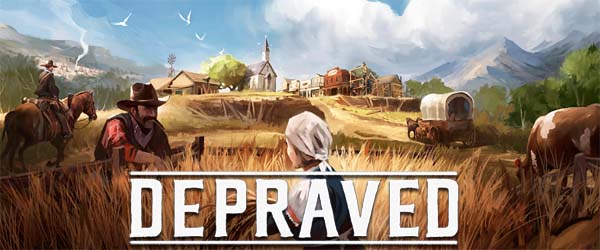
Well, the NFL season has been as good as over for us Bears fans since November, which means my interest in this year's slate of football video games is waning. That means it's time once again to dive into my back catalog of Steam games. This time, I decided to boot up Depraved, a wild west city-builder that was sitting on my wishlist for years (back when it was still in early access), and which I bought during a sale earlier this summer.
Having really enjoyed Banished many years ago, I've had my eye on other historic city builders like Depraved, Foundation, Builders of Egypt, Atomic Society, and others. Depraved is probably the closest thing to Banished that I'm likely to find. It's basically just Banished with a wild west theme instead of a medieval theme.
Depraved shares a lot in common with Banished [RIGHT].
Depraved shares a lot in common with Banished. Both games are about small, relatively isolated communities of pioneers trying to get by in a harsh, unrelenting environment. Both require stocking up food, firewood, and warm clothing in time for cold winters. And both use depleting resource reserves to force players to expand out further into the map.
Where Depraved differs from Banished is that Depraved has a much greater focus on trade. Unlike in Banished (which has the player constructing one mega-settlement), Depraved keeps settlements relatively small, but allows the player to create additional satellite towns on the map, which can each be specialized for the exploitation of specific resources or the production of specific goods. Then all those small towns can trade raw resources and manufactured goods with each other. There's also small Native American tribes that the player can trade (or war) with, as well as the occasional bandit camp popping up to harass your population and rob your bank.
The other big difference is that Banished is a much better and more polished game.
How does any of this work?
My experience with Depraved suffered greatly from the lack of a robust and informative tutorial. If I recall correctly, Banished's tutorial takes the player through a guided scenario through creating a small settlement and surviving the first winter. There's still a lot of trial-and-error in Banished, but the tutorial does a good job of covering all the basics.
Depraved, on the other hand, gave me four pop up widgets explaining the basic mechanics in text, then just let me loose on the map. There's no playable tutorial at all, and additional tutorial pop-ups are few, far between, and less informative than I would like them to be. This lead to me just sort of winging-it for my first settlement, then restarting after I had self-taught myself the basics.
This is your idea of a tutorial?!
Don't get me wrong. Depraved isn't unplayably awful. It just isn't very good at explaining itself and requires a lot of tedious micro-management. If you're fine with that, then this game will be enjoyable enough. In fact, the first few hours are thoroughly enjoyable. Depraved starts off very small and simple, with just a single settlement, a dozen or so pioneers, and a few buildings. Getting the basics of hunting for food and chopping down trees for lumber is simple enough that the player can learn on the fly. It doesn't require extensive tutorials in these early hours.
[More]
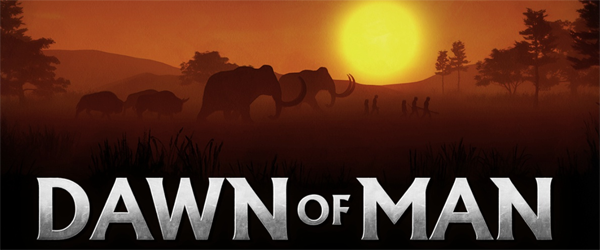
From what I've read, Madruga's indie management sim Dawn of Man has proven to be far more successful than the developers had ever imagined. The game made it onto Steam's top-sellers list the month that it released and was a surprise hit. I've actually had the game on my radar for quite some time. I saw a preview for it back in mid 2018 in a YouTube video about "upcoming strategy games for 2019". I watch those from time to time to see if any new games are coming out in the niche genres that I enjoy -- like city-builders, strategy games, and horror games.
My two favorite PC games are the Civilization games and city-builders like Cities: Skylines, so a management sim / city-builder set during the stone, bronze, and iron ages seemed right up my alley.
A prehistoric city-builder is an idea that is right up my alley!
Like any good management sim or city-builder, Dawn of Man has a "one-more-season" addictiveness that kept me playing into the wee hours of the morning trying to balance my food stockpiles and finish that next set of construction projects before saving and quitting. I'd tell myself that I'd play it for an hour or two, then switch to Sekiro, or work on a Civilization strategy guide, but five hours later, I'd be building palisades and watchtowers to protect my little neolithic farming village from plundering raiders, or sending an expedition halfway across the map to hunt one of the last few remaining wholly mammoths.
Learning by doing
You start the game as a small group of 7 paleolithic humans (half of which are children) living in a handful of animal skin tents. You hunt animals, gather sticks and stones, pick berries and nuts, craft simple tools, and eventually expand your handful of tents into a bronze or iron age city -- complete with walls and an army.
Your progress through the eras is governed by the accumulation of knowledge points. These knowledge points are gained by completing certain tasks or milestones within the game. Your people effectively learn by doing, and through repetition. Each "first" within the game will earn a knowledge point. Build your first hut: gain a knowledge point. Hunt your first deer: gain a knowledge point. Craft your first composite spear: gain a knowledge point. Plant your first crops: gain a knowledge point. And so on.
You accumulate knowledge points by
completing in-game tasks or milestones.
After that, you gain further knowledge points by repeating certain tasks or stockpiling certain resources. Crafting 10 bows will be another knowledge point. Drying and curing 100 units of meat would be another knowledge point. And so on.
You're constantly and gradually earning new knowledge. You can turn in lump sums of these knowledge points for new technologies in a technology tree.
I like this mechanism of "learning by doing". There is no place-it-and-forget-it "research" building or school that passively accumulates knowledge points like what you might see in other strategy games like Civilization. Learning is an active process for your little simulated people, even though most of your knowledge points will come from activities that are automated anyway.
... [More]
8bb5fcaa-40f9-429e-bb8c-c0e44b7d6529|2|5.0
Tags:Dawn of Man, Madruga Games, village, city, strategy, city simulation, city planner, prehistory, paleolithic, mesolithic, neolithic, copper age, bronze age, iron age, mammoth, hunting, gathering, indie gaming
Last week, just in time for the announcement (and release) of a new expansion for Cities: Skylines, I posted a video analysis on YouTube discussing what I perceive as weaknesses in the modular design philosophy behind Skylines' myriad expansion packs. The full video is available on YouTube (and embedded below), but I've also transcribed the text in blog form for those who may prefer reading over watching/listening.
The video is up on YouTube.
I want to start out by saying that I love Cities: Skylines. Skylines is -- without a doubt in my mind -- the single best city-builder since SimCity 4, which released in 2003 (over 15 years ago, as of the time of this recording). When I watched the first trailer for the game, in which the player apparently custom-builds freeway ramps and interchanges from scratch (at about 40 seconds into the trailer), I was sold on this game! After years of having to use boring, pre-fabricated stock on-ramps and interchanges, the little civil engineer withing me practically jizzed in his pants at the idea of being able to build my own highway ramps and interchanges! And there was no looking back.
Cities: Skylines gloriously succeeds where games like SimCity (2013) and Cities XL miserably failed. It picks up the mantle of the great SimCity games of yester-decade, and brings it into the 21st century with deep simulation based on agents, a sleek and modern UI, extensive customizability and moddability, and an attractive 3-D graphics engine. It's made all the more impressive by the fact that the game's developer, Colossal Order, is a small, independent studio that had something like nine people working for it when the game initially launched. And a company with all the manpower and resources of Electronic Arts only managed to produce a flop like SimCity 2013.
... [More]
cdac9d28-8482-4449-a673-ff10d4b7cc87|0|.0
Tags:Cities: Skylines, Cities: Skylines: After Dark, Cities: Skylines: Snowfall, Cities: Skylines: Natural Disasters, Cities: Skylines: Mass Transit, Cities: Skylines: Green Cities, Cities: Skylines: Parklife, Cities: Skylines: Industries, Cities: Skylines: Campus, Colossal Order, city planner, city simulation, strategy, Steam, Paradox Interactive, expansion, YouTube, Sid Meier's Civilization, Civilization V, Civilization V: Brave New World, Civilization VI, Civilization VI: Rise and Fall, Civilization VI: Gathering Storm
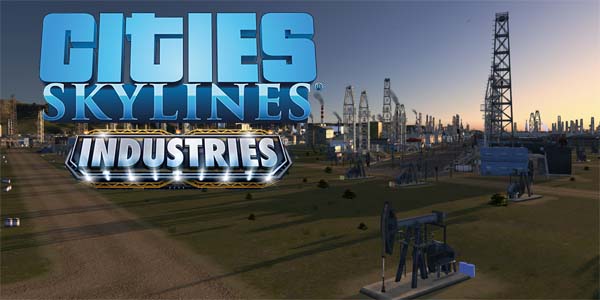
Wow, Colossal Order is really popping out these Cities: Skylines expansions in rapid succession! I feel like this is the third or fourth expansion in the last year alone! ... Hold on, let me check ...
| Expansion title | Original release |
 | After Dark | 24 September 2015 |
 | Snowfall | 18 February 2016 |
 | Match Day* | 9 June 2016 |
 | Natural Disasters | 29 November 2016 |
 | Mass Transit | 18 May 2017 |
 | Concerts* | 17 August 2017 |
 | Green Cities | 19 October 2017 |
 | Parklife | 24 May 2018 |
 | Industries | 23 October 2018 |
| * denotes a mini content pack, rather than full expansion. |
... So, yeah; third full expansion in the last 12 months (give or take a few days). Fourth expansion in the last 14 months if you want to count the Concerts content pack. Colossal Order seems to have been following a pattern of two full expansions and a mini content pack each year since the game released. I guess that's one way to keep your game relevant. It has certainly kept me coming back every few months.
Never as robust as I would like
The problem is that the limited development time means that the content that is provided in these expansions rarely ever feels as robust or comprehensive as it should -- at least, not to me. As such, I feel like I'm getting diminishing returns from each new expansion. The amount of content that is already in the game means that each new expansion feels like relatively smaller drop of content into an already-large bucket. Each expansion feels like it gives us less to do, and has that much of a smaller impact on the overall gameplay experience.
Adding to the problem of diminishing returns: every single expansion has had some glaring omission or weakness that bothered me, and none of the later expansions have bothered to go back in and address the weaknesses and limitations of the previous expansion(s). After Dark failed to include zoneable public beaches and didn't really make the day/night cycle feel as meaningful as it should. Snowfall failed to include season cycles to go along with After Dark's day/night cycle, and completely dropped the ball with regard to mechanics like ski resorts. Natural Disasters probably felt like the most "complete" and well-rounded expansion (not to mention the most novel one), but still suffers from its content being random, and it neglected to introduce any winter-specific disasters to go along with Snowfall.
Industries follows a long-standing trend with Skylines expansions neglecting seemingly-obvious features.
Mass Transit brought the long-overdue ferry transit option, but neglected to revise cargo harbors to make cargo ship routes more practical, and didn't have any water-based city services (like a coast guard, for example) that would allow a true island economy to function without a network of bridges for freight and emergency services. Green Cities was maybe the laziest expansion, and it focused on pollution-management, but didn't bother to actually make pollution any more relevant or challenging to begin with. Lastly, Parklife granted a lot of player expression, but failed to incorporate the legacy parks into the new modular park feature and doesn't allow the camera to zoom in close enough to get a good look at your pretty decorations.
This isn't to say that all these expansions are "bad". I've liked them all (except maybe for Snowfall and Green Cities), but none of them have really wow-ed me with their content (except maybe for Natural Disasters). And the modular nature of each expansion means that it has limited-to-no impact on the core game systems, and limited-to-no interaction with the previous expansions.
The latest expansion, Industries follows suit. It promises to re-invent the way that your cities' industry functions, but kind of does it in an almost half-assed way. Much like the expansion before it, Parklife, Industries doesn't really incorporate the old legacy industry zones into the new industry mechanics. The new "Industry Area" paintbrush is virtually the same mechanic as the Park Area paintbrush from the last expansion. It isn't a replacement for the original industrial district specialization, so if feels like it's pretty much duplicating that content rather than re-inventing it.
You paint an area as an "Industrial Park", just like the parks in Parklife.
... [More]
e7bfb680-e9c4-4e53-a202-52f87d32d445|3|3.7
Tags:Cities: Skylines, Cities: Skylines: Industries, Colossal Order, Paradox Interactive, city, city planner, city simulation, Cities: Skylines: Parklife, Cities: Skylines: After Dark, industry, pollution, natural resources, resources, production chain, district, farm, timber, lumber, ore, mining, oil, drilling, leisure, commerce
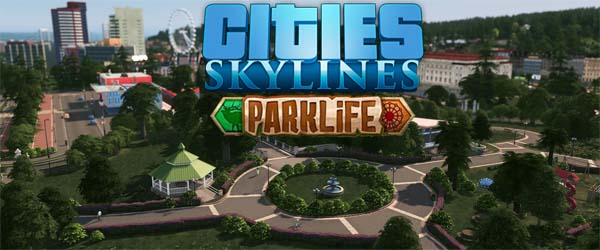
Parklife is perhaps the single Cities: Skylines expansion that I have most looked forward to. That is because the focus of the expansion seems to be pulled almost verbatim from my own "Great Outdoors" wishlist. I'm not going to take credit for having designed this expansion for Colossal Order, because I posted that wishlist in February, and the game is releasing in May, so unless Colossal Order is supernaturally efficient at creating expansions, there simply wasn't enough time for them to design and implement Parklife after reading that wishlist. It seems like someone in Skylines design is thinking along the same wavelength as me. But who knows? Maybe somebody did see my wishlist and incorporate some elements of my ideas into the development in progress? It's certainly one heck of a coincidence!
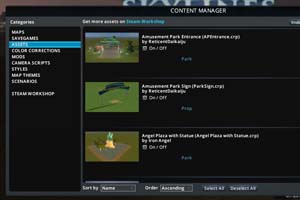
Much of Parklife's content seems inspired by mods.
In any case, it should seem pretty obvious that I'm pleased to see this expansion incorporate so many of my own ideas and suggestions. While Parklife still isn't going to offer the same degree of freedom and creativity that you can get from mods, having these more free-form park-creation and decorative tools should be a welcome addition for anybody who enjoys adding a little more personal flavor to their city. And honestly, is there anyone playing a city-builder who doesn't enjoy making their city look pretty?
A walk in the park
One of the strengths of Cities: Skylines has always been the way that the game utilizes its space and the natural environment. The mechanical limitations of the terraforming tools means that you rarely (if ever) have the money and terrain available to make wholesale changes to the geography of the map. Even if you have a billion dollars saved up in your city's coffers, the fact that every cubic meter of dirt that you excavate has to go somewhere, and every cubic meter of dirt that you dump has to come from somewhere, means that you can only do so much to modify the map. Starting out with a limited budget, small pool of unlocked buildings, and a relatively small plot of land means that young cities often have to work around environmental and natural obstacles, which made those obstacles part of the character of your city. Well now you can actually formally use those obstacles.
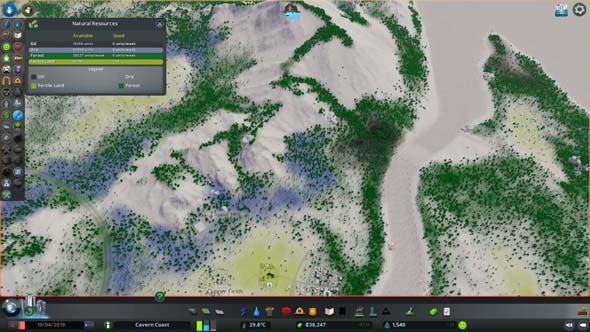
I now have a more meaningful choice of how to utilize this resource-rich mountain.
Parklife allows you to leverage these features of your landscape as part of your city-beautification plans. That mountain that is too big to level, and too steep to realistically build on, can now be turned into a massive park, complete with hiking trails, lookout points, and so forth. If that mountain also happens to have ore or oil resources under it, then now I suddenly have some meaningful choices to make on how to effectively utilize the resources. What used to be a near-obvious matter of "build some mines" actually has some viable alternatives.
Sure, you were always able to place walking paths in places like that, but the game (and the citizens of your city) never really recognized it as a place they can go for leisure and entertainment. If they didn't have to go to work on the other side of that mountain, they simply wouldn't walk those trails. No matter how beautiful you would make it, that mountain-side hiking trail was always little more than useless dead space.
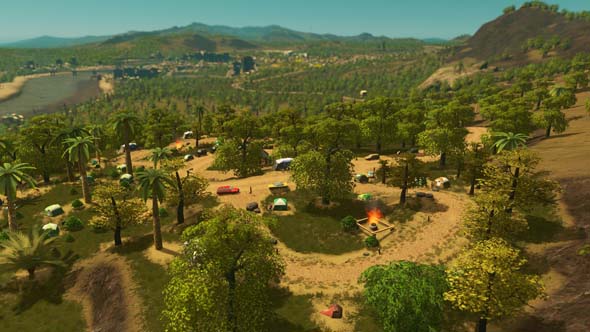
Areas that used to be dead space that was impractical for construction can now be utilized.
That's no longer the case. Every last square meter of your city can now be turned into useful park space if you feel so inclined... [More]
b8210839-3c7d-4e96-8336-45021463d728|1|5.0
Tags:Cities: Skylines, Cities: Skylines: Parklife, Colossal Order, Paradox Interactive, city, city planner, city simulation, park, national park, nature reserve, amusement park, zoo, environment, tourism, tour
|

| 12 | | | | | | | 60 | | 11 | | | | | | | 55 | | 10 | | | | | | | 50 | | 09 | | | | | | | 45 | | 08 | | | | | | | 40 | | 07 | | | | | | | 35 | | 06 | | | | | | | 30 | | 05 | | | | | | | 25 | | 04 | | | | | | | 20 | | 03 | | | | | | | 15 | | 02 | | | | | | | 10 | | 01 | | | | | | | 05 |
|